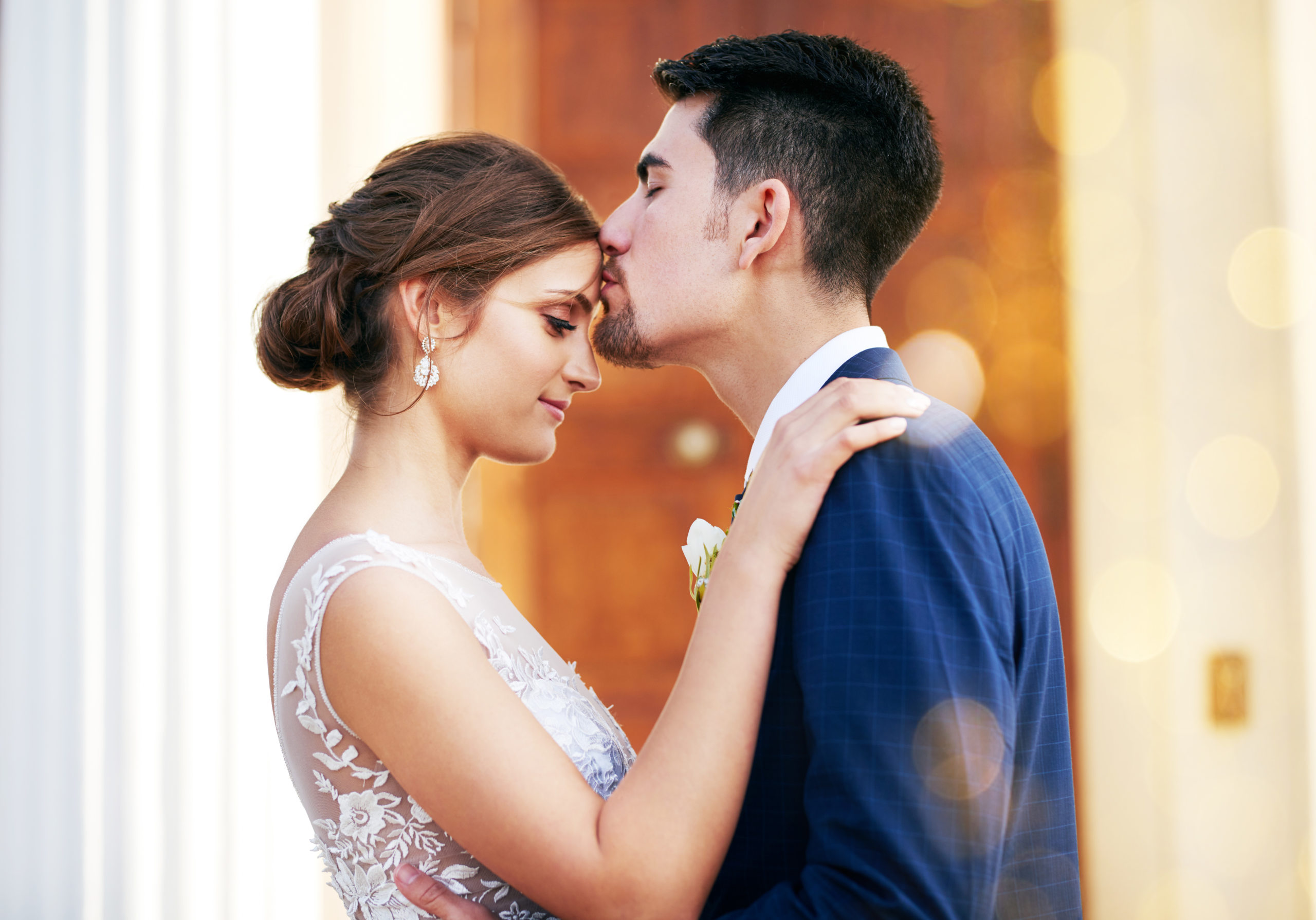If you and your partner have decided to put a ring on it, mapping out your future together — starting with the wedding — is an exciting time. But planning a traditional wedding can be overwhelming and costly, too.
According to The Knot’s 2019 Real Weddings Study, the average U.S. wedding costs $33,900, and that’s not even including a honeymoon. Although some couples receive financial support from their families to help cover costs, others may opt for a courthouse wedding.
Going with a courthouse wedding is one way to save money and simplify the wedding planning process. Keep reading to learn more about how getting married at the courthouse works, what you may need to say “I do,” and how to make a courthouse wedding special:
- What Is a Courthouse Wedding or Civil Wedding?
- Courthouse Wedding Requirements
- Courthouse Wedding: What You Need To Get Married
- Considerations When Thinking Of Getting Married At the Courthouse
- Planning a Courthouse Wedding or Civil Wedding That’s Uniquely You
- What To Expect: One Bride’s Courthouse Wedding Story
- The Bottom Line on Courthouse Weddings
What Is a Courthouse Wedding or Civil Wedding?
Courthouse weddings go by a few names, including a “civil wedding” or “civil ceremony.” A civil wedding is a nonreligious, legally recognized marriage ceremony that’s performed by certain government officials or other authorized persons.
Tonia Adleta, owner and creative director of Aribella Events in Philadelphia who has more than two decades’ worth of experience in the wedding industry, has helped couples navigate the civil wedding process. She says that many of the elements we’ve come to identify as part of a “traditional” wedding can still be incorporated into a civil wedding, like preparing your own vows and including your favorite flowers in the ceremony
The big difference is that very few of the traditional expectations — like a lengthy ceremony and large guest list — apply. Courthouse weddings offer couples a good opportunity to simplify the wedding planning process by keeping the ceremony personal yet intimate.
Courthouse Wedding Requirements
Like with traditional weddings, your civil ceremony must adhere to the legal requirements of your state to be considered a valid union. For example, many states require you to obtain a marriage license before your courthouse wedding, and your state may require a witness to be present during the ceremony.
You can find information on local civil weddings from your state’s or city’s .gov website, or at your city or county clerk’s office.
How much does it cost to get married at the courthouse?
Some states charge a flat marriage license fee and others vary by city or county, so the cost of a civil wedding depends on your location. There are other expenses to consider as well, such as a county-appointed witness or a government-approved officiant. Please contact your city or county clerk’s office for the exact cost of a courthouse wedding in your area.
To start, here’s a breakdown of marriage license fees by state:
| State | Marriage License Fee | Good To Know |
|---|---|---|
| Alabama | N/A | Alabama no longer requires a marriage license; instead, you pay a fee (varies) to record your marriage with the county probate court |
| Alaska | $60 | Your marriage license will be ready for pickup after three business days |
| Arizona | $83 | N/A |
| Arkansas | $60 | N/A |
| California | Varies by county | N/A |
| Colorado | $30 | N/A |
| Connecticut | $50 | N/A |
| Delaware | $70 | The cost is $120 if neither applicant lives in Delaware; there’s a waiting period of 24 hours before you can hold the ceremony |
| Florida | $86 | If you complete a premarital preparation course, the marriage license fee is $61 and the three-day waiting period isn’t required |
| Georgia | Varies by county | Your county may reduce the marriage license fee if you complete a premarital education course |
| Hawaii | $60 | There’s an additional $5 administrative cost |
| Idaho | Varies by county | The marriage license fee is roughly $30 in cash |
| Illinois | Varies by county | There’s a one-day waiting period between when you receive the license and when it becomes valid |
| Indiana | $18 | The marriage license fee increases to $60 if both applicants aren’t residents of Indiana; the fee is typically paid in cash |
| Iowa | $35 | After receiving the license, you must wait four days before getting married |
| Kansas | $85.50 | Cash only; there’s a waiting period of three days before you can get married |
| Kentucky | $50 | N/A |
| Louisiana | Varies by parish | You must wait 24 hours after purchasing the marriage license before you can hold the ceremony |
| Maine | $40 | Marriage licenses are issued at the city or town level (rather than by county) |
| Maryland | Varies by county | The license must be obtained at least two days before the marriage ceremony |
| Massachusetts | Varies by city or town | Marriage licenses are issued at the city or town level (rather than by county); you must wait at least three days before holding the ceremony |
| Michigan | $20 | The marriage license costs $30 if neither applicant is a Michigan resident; there’s a three-day waiting period before the license becomes valid |
| Minnesota | $115 | If you complete 12 hours of premarital education, the license costs $40; the waiting period varies and can last up to 30 days under certain circumstances |
| Mississippi | Varies by county | N/A |
| Missouri | Varies by county | N/A |
| Montana | $53 | N/A |
| Nebraska | $25 | A certified copy of your marriage license (required for legal name changes) costs an additional $9 |
| Nevada | Varies by county | N/A |
| New Hampshire | $50 | N/A |
| New Jersey | $28 | There’s a 72-hour waiting period before the marriage license is issued |
| New Mexico | $25 | N/A |
| New York | $35 in New York City; $40 elsewhere | You must wait at least 24 hours to hold your marriage ceremony after the license is issued |
| North Carolina | $60 | A certified copy of your marriage license costs an additional $10 |
| North Dakota | $65 | N/A |
| Ohio | Varies by county | For Ohio residents, the marriage license must come from the county where you reside; for nonresidents, you have to obtain the license in the county where you’re holding the ceremony |
| Oklahoma | $50 | The marriage license fee is reduced to $5 if you complete premarital counseling |
| Oregon | $60 | There’s a waiting period of three days before you can hold the ceremony |
| Pennsylvania | Varies by county | The marriage license will be issued after a three-day waiting period |
| Rhode Island | $24 | Rhode Island residents may apply for a marriage license in the town or city where they live; nonresidents must obtain their license in the city or town where the ceremony will be held |
| South Carolina | Varies by county | There’s a 24-hour waiting period before the marriage license can be issued |
| South Dakota | $40 | N/A |
| Tennessee | Varies by county | The license fee is reduced by $60 if you take a premarital preparation course |
| Texas | Varies by county | There’s a 72-hour waiting period before you can get married; completing a premarital education course will waive a portion of the license fee |
| Utah | Varies by county | N/A |
| Vermont | $60 | Marriage licenses are issued by town clerks; Vermont residents must purchase their license in the town where they live |
| Virginia | $30 | N/A |
| Washington | Varies by county | You must wait three days before getting married |
| West Virginia | $56 | The license fee is discounted to $36 if you complete premarital counseling |
| Wisconsin | Varies by county | There’s a waiting period of five to six days before you can get married |
| Wyoming | $30 | N/A |
Courthouse Wedding: What You Need To Get Married
Although a courthouse wedding can take less time to plan than a traditional wedding, it’s a good idea to give yourself enough time to figure out the details.
The documentation and timelines you need to be aware of depend heavily on your state’s requirements. There’s often a waiting period between when a marriage license is issued and when it’s active, and once the license is active, it’s usually valid for a limited number of days. For example, in Los Angeles County, marriage licenses expire after 90 days. This means you must hold your ceremony before the license expires.
Courthouse wedding checklist
- Do your research. Learn about the specific state and court requirements in your area. Preparing in advance can help you avoid extra trips to the courthouse and additional fees that can spoil the experience.
- Gather the required documents. Start collecting the information you’ll need for your marriage license application, which may include:
- Valid photo identification (i.e., passport, driver’s license, or other government-issued ID)
- End date and other details about previous marriages
- Birth certificate
- Proof of residency
- Apply for a marriage license. Now that your documents are ready, you and your betrothed can visit the city or county clerk’s office. Fill out the necessary forms and pay the fee. You may need to make an appointment in advance.
- Set a courthouse ceremony date. Keep in mind that choosing a wedding date is first come, first served, so planning ahead is ideal — especially if you have a certain date or time in mind.
- Secure a court-approved officiant. Confirm with your courthouse that your ceremony will have a government official present.
- Get a witness (if necessary). Some states require a witness or two, so choose someone you’d like to include in this special moment and share the logistics of your ceremony.
- Invite your family and friends. You can typically invite a handful of family members or friends to join you during the ceremony. Make sure to ask your courthouse about the maximum number of guests permitted.
- Think about post-ceremony celebrations. Whether you and your spouse choose to celebrate on your own or host a reception with your loved ones, you can mark the occasion in a meaningful and joyous way.
Considerations When Thinking Of Getting Married At the Courthouse
Deciding to have a courthouse wedding is a personal choice that you and your future spouse will want to talk through together. Although holding a civil ceremony is a great option financially, there are other considerations you should discuss before taking this route. The right decision will reflect your shared preferences and values.
Some questions to ask yourselves include:
Do you want your ceremony to be more of an elopement, without others present?
- Will your family or friends be supportive if they’re not invited? Is their opinion important to you?
- Will either of you look back 10 years later and regret not having a traditional wedding?
- With the risk of COVID-19 spreading at gatherings, how safe is it in your area to host guests at your event? Are any of your loved ones at higher risk for severe illness?
Planning a Courthouse Wedding or Civil Wedding That’s Uniquely You
If you and your partner are mutually confident and excited about the idea of having a courthouse wedding, there are many ways to tailor a civil ceremony to your tastes.
“So many of the Pinterest or Instagram-worthy details that we all love can absolutely still be incorporated into a civil wedding,” Adleta says. “For example, there’s no reason why you still can’t have beautiful stationery to invite your closest friends and family to witness your union.”
Here are a few simple, budget-conscious ways to make your courthouse wedding feel special.
Dress comfortably
So, what should the bride(s) and groom(s) wear? If you still want to splurge on designer wedding attire, you can. But with a civil ceremony, spending thousands of dollars on outfits isn’t an expectation. Instead, find clothes that speak to your personal style.
Gift flowers to your guests
To help set the mood, set out a basket of corsages and boutonnieres by the courtroom entrance for your guests. This extra touch adds to the vibe of the room, and the florals can act as wedding favors for guests.
Ask your guests to be photographers
Civil ceremonies can happen within just a few minutes. Ask your guests to use their smartphones to take candid photos and be your videographers throughout the big day. This includes when you and your partner are getting ready, during the ceremony, and beyond.
Arrive in style
To make the day memorable, consider booking a limousine to and from the courthouse. Another option is ordering a premium vehicle through a ride-hailing service like Uber Black, which uses luxury cars and top-rated drivers for a touch of VIP treatment.
Plan for a post-ceremony celebration
Making plans for after the ceremony can help mark this momentous occasion in your lives. For example, you could walk down memory lane by having dinner at the restaurant where you and your partner had your first date. If you want to invite family and friends, planning a small reception gives your loved ones a chance to toast to your happy union.
What To Expect: One Bride’s Courthouse Wedding Story
Diana Stellick and her spouse, Matthew, knew they both wanted a courthouse wedding.
“Neither of us see the point in spending a ton of money while we’re young and still building our savings,” Stellick says. “Weddings, from our viewpoint, take a big chunk out of savings for either us personally, or our parents — if they chip in.”
In January 2019, the couple made their joint vision a reality by getting married in a Los Angeles courthouse. While they thought about the idea for about 10 months leading up to the big day, their courthouse wedding took about a month to plan.
“I was surprised that you actually have to still plan it,” Stellick says. “I think I was at the courthouse three times in total for paperwork and setting a date. You can’t just walk into the courthouse the day of and get married.”
In addition to making multiple trips to the courthouse for paperwork, they were required to arrive between 30 minutes to an hour ahead of their ceremony appointment time. The courthouse was on a tight schedule of appointments, requiring couples to show up early to avoid delaying their own ceremony and impacting others.
“There was an officiant, and he tried to get to know us a little bit before the ceremony, which was unexpected,” Stellick says. “The officiant had vows prepared, but you’re allowed to say your own vows if you’d like. Rings are still exchanged, if you want, and you can invite people. I think our courthouse held maybe 15 to 20 seats for guests.”
She said that the civil ceremony experience was quick and relatively hassle-free. After the courthouse ceremony, the newlyweds splurged at an upscale L.A. steakhouse to celebrate.
“We did this because we wanted to mark the occasion and treat ourselves,” Stellick says. “It was our wedding day, after all.”
The couple is currently saving to buy a home outside of L.A. Once they reach this goal, they plan to host a larger wedding reception with close family members and friends.
“We have a baby and also want him and any future children to be able to be a part of the fun and celebrate our family with everyone,” Stellick says. “Because of these things, we want to wait to have this part of the wedding tradition until it feels right for us and our family.”
The Bottom Line on Courthouse Weddings
If you’re thinking about having a courthouse wedding, make sure to communicate openly and honestly with your partner and confirm that you’re both on board. Although there’s still some paperwork and planning involved before you’re able to get hitched, a courthouse wedding could help you save a lot of money — and it can be designed in a way that’s personal to your relationship and style.



